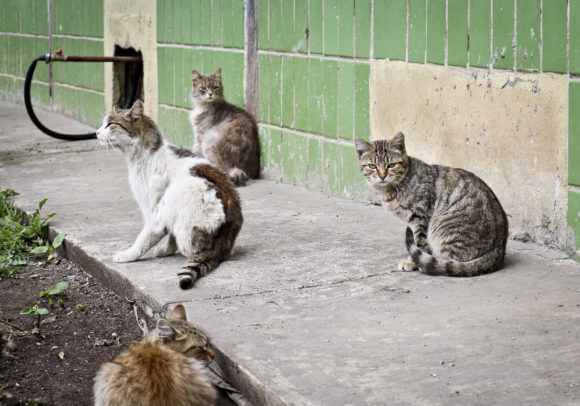Some bears can balance balls on their noses and some elephants can perch on pedestals, but that doesn’t make them domestic animals.
On that principle, the Arizona Court of Appeals revived a claim against State Farm Fire and Casualty Co. for damages caused by feral cats that was denied because the policy excluded any damages caused by “domestic animals.”
Owners Joel and Kim Goldberger contend that their Flagstaff rental property suffered $75,000 in damages because their tenants had allowed “feral cats” to “access” the dwelling. The trial court erred by accepting State Farm’s argument that feral cats are domestic animals without giving the Goldbergers a chance to prove that they are not, the appellate panel said in an opinion released Tuesday.
“Several of State Farm’s arguments rely on the assumption that these cats were peaceably living in the home with the tenant,” the opinion written by Judge Michael J. Brown says. “The superior court, at least in part, appeared to follow State Farm’s lead.”
The appellate panel said the exclusion isn’t that simple.
The State Farm policy specifically excluded damages caused by “birds, vermin, rodents, insects or domestic animals.” The appellate court said “domestic” can be defined so that it applies broadly to all species of animals that have been domesticated at some point in history, or it can be defined to mean individual animals that are kept by a person for various purposes, including as pets.
State Farm argued for the broad, species-based definition. The carrier pointed to a 2016 decision by the 9th Circuit Court of Appeal in Bjugan v. State Farm that upheld the dismissal of a claim for damage caused by a renter who kept 95 cats and two dogs in a rental house.
The court, however, said those animals were clearly maintained by the renter, meaning they were obviously domestic animals. Nothing in the Goldberger’s complaint asserted that the cats that damaged the rental home were maintained by the tenants, and the trial court was required to look only within the pleadings when deciding whether to dismiss the suit in summary judgment for failure to state a claim.
The opinion says it is relevant that the policy exclusion applies to “domestic animals” but not “domesticated animals.” In modern usage, a domestic animal refers to a pet that lives with a family, while a domesticated animal is an animal that was once wild but has long been bred for human use.
So where does that leave feral cats?
The court said that depends on whether one uses the broad definition or the definition that applies to individual animals. State Farm had argued that the purpose of the exclusion was to exclude coverage for damages that the insured could easily detect and prevent. The argument didn’t help its case since the animals in question were described as feral cats.
“There is nothing predictable about when such an animal, lacking an owner or keeper and living in nature, might damage a dwelling,” the opinion says. “And a homeowner has little, if any, meaningful ability to control such animals should they happen to wander onto the property.”
The court said considering the purpose of the policy exclusion, it is more reasonable to use the definition of domestic animal that applies to individual animals. After all, some people keep exotic animals such as snakes and monkeys as pets. Using a broad definition based on the species of animal would require the insurer to cover damages caused by such animals even though the homeowner could easily prevent the damage.
The opinion concludes that the term “domestic animals” encompasses specific animals that are subject to the care, custody and control of a person. The decision to dismiss the case was in error because the superior court judge did not reach a finding as to whether the Goldbergers’ tenants cared for and controlled the feral cats that “accessed” their property.
The appellate court remanded the case to the superior court for further proceedings. It also rejected both State Farm’s and the Goldberger’s request for attorney fees but said it will consider the Goldbergers’ request after the case is concluded at the superior court.
Was this article valuable?
Here are more articles you may enjoy.


 These Five Technologies Increase The Risk of Cyber Claims
These Five Technologies Increase The Risk of Cyber Claims  Danone Infant Formula Recalls Expand in UK, Ireland
Danone Infant Formula Recalls Expand in UK, Ireland  Tesla Sued Over Crash That Trapped, Killed Massachusetts Driver
Tesla Sued Over Crash That Trapped, Killed Massachusetts Driver  LA County Told to Pause $4B in Abuse Payouts as DA Probes Fraud Claims
LA County Told to Pause $4B in Abuse Payouts as DA Probes Fraud Claims 